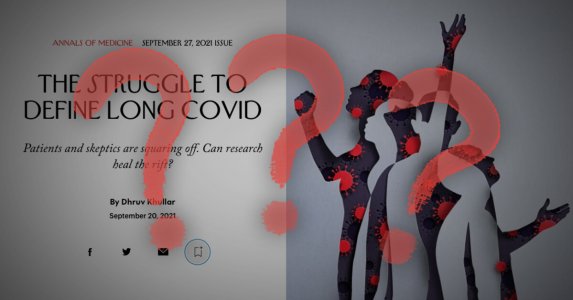A person with ME (who wishes to remain anonymous online) sent this letter to the author of The New Yorker article, “The Struggle to Define Long COVID,” and to the magazine’s editor.
#MEAction was also concerned to see The New Yorker publish such a disparaging and flawed article about the Long COVID community, which cherry-picked examples of patient involvement while ignoring the incredible patient-led research the community has done to accelerate and strengthen research into Long COVID.
10/2/21
Dr. Khullar:
I am writing to you directly about your recent article on Long Covid with the hope you will take my comments to heart. I will copy The New Yorker as well.
It is clear that you are a compassionate person, struggling to understand a true conundrum. That said, I think your article was facile in many ways and reflects a dated and ill-informed understanding of post-infectious disease.
1. To start, before I comment on your treatment of Berrent, let me say that I do not know Berrent and did not hear of her before your article. My first complaint is that you treat Diana Berrent and her most fervent supporters/followers as the spokesperson/people for all those suffering from Long Covid. I think that is presumptuous and speculative. Further, some of your criticisms of her…and the conclusions you draw – seem unwarranted and exaggerated. Assuming for the sake of argument (and I actually agree with you here) that some of the ailments she views as symptomatic of Long Covid are far-fetched, you use that as a reason to dismiss commonly accepted Long Covid symptoms and imply primarily psychogenic causation. You also ignore that some of her critiques, like CDC’s decision not to investigate non-severe Long Covid cases, were also voiced by many medical/public health professionals. Similarly, you criticize her for her view of “mild” Covid cases. Yes, she is wrong to say that there are no mild cases. But it’s also true that the public – having no reason to know better – interpreted “mild” in the dictionary sense – whereas the medical establishment considers “mild” anything that is not severe, i.e, resulting in hospitalization or death. Medical “mild” can still make one quite ill. Further, even asymptomatic and layperson’s “mild” cases cause Long Covid.
2. You seem dismissive of the validity of a “syndrome” or illness until research has established the cause or found a diagnostic test. Surely you know that serious illnesses such as MS and ulcers were once considered to be psychogenic in origin. And that post-infection sequelae have followed many past viral outbreaks. Instead, you choose to highlight Jeremy Devine’s view that Long Covid “is largely an invention of vocal patient activist groups” rather than talking to Long Covid experts/researchers. This is reminiscent of those who dismissed ME/CFS* as psychogenic. You don’t seem prepared to acknowledge that people can have diseases such as chronic fatigue syndrome, merely referring to “people who say they suffer from chronic fatigue syndrome….. Have you read the 2015 National Institute of Medicine Report on chronic fatigue syndrome or looked at the CDC/NIH websites on the disease? You characterize such diseases by saying “some researchers consider [them] ill-defined,” in a way that dismisses them rather than reflecting years of research neglect. Fortunately, there has been a lot of progress recently. Here’s just one article that was recently published in PNAS, both about ME/CFS and Long Covid. https://www.pnas.org/content/
3. Try talking to Avindra Nath, M.D, the Clinical Director of NINDS, the Director of the Translational Neuroscience Center, and Chief of the Section of Infections of the Nervous System, who is leading research on ME/CFS and Long Covid. Or Cornell’s own Mauren Hanson, Director for the Center for Enervating Neuroimmune Disease. Or Ian Lipkin at Columbia. I doubt any of them would say Long Covid “lives for the moment in the realm of theory and anecdote.” Your choice of interviewees was unbalanced.
4. You might have deduced that I am writing with some connection to Long Covid. Luckily, I have not had Covid. But I have had ME/CFS for 21 years. Consequently, I am all too aware of the medical establishment not having taken ME/CFS seriously. The ME/CFS community is, in fact, very distrusting of the medical community because patients often have not been treated with respect or understanding, and research into diagnosis, causation and treatment was at a standstill for decades. Thankfully, there has been a major turnaround in scientific understanding in recent years. But, based on the ME/CFS experience, I fear the views that you stated or implied about Long Covid, and the leaps you took in reaching conclusions, pose a greater problem than what some Long Covid advocates may have gotten wrong. I feel that you knew what you wanted to say and cherry-picked to support your conclusions. Please do your homework next time.
Respectfully,
* Please also note that federal agencies, numerous clinical guidance providers, and people afflicted by the disease now use the term myalgic encephalomyelitis/chronic fatigue syndrome (ME/CFS) instead of chronic fatigue syndrome.





1 thought on “A Response to New Yorker Article on Long COVID”
Yes. Yes. Yes. Thank you Anonymous.
Comments are closed.